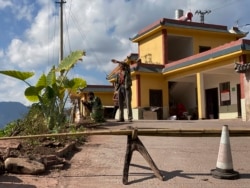The Associated Press (AP) has found that the Chinese government is controlling all research into how the coronavirus started.
The government is limiting some research while putting forward unlikely ideas that it could have come from outside China.
Secrecy and control
The AP’s investigation found that government secrecy and high-level control have been at work throughout the pandemic.
This culture of secrecy and control delayed warnings about the pandemic. It blocked the sharing of information with the World Health Organization (WHO) and hurt early testing.
Scientists who study China’s public health system say some research has been limited, including studies of how the virus that causes COVID-19 began.
“They only select people they can trust, those that they can control,” said a public health expert who works regularly with the Chinese Center for Disease Control and Prevention. The expert did not want to be identified out of fear of punishment. But some Chinese scientists say little has been shared simply because nothing of importance has been found.
Zhang Yongzhen, a Chinese virus expert, said “We’ve been looking, but we haven’t found it.”
Research, cooperation, and origins
A World Health Organization international team plans to visit China in early January to investigate what started the pandemic. Its members and agenda, or plan, had to be approved by China.
Some public health experts warn that China’s refusal to help international scientists has hurt the spirit of cooperation that found the source of the SARS outbreak nearly 20 years ago.
In April, President Donald Trump ended a U.S.-financed project to identify dangerous animal diseases in China and Southeast Asia.
Trump also has accused China of releasing the virus through an accident at a Wuhan laboratory.
That idea, some experts say, cannot be ruled out. But, as of now, it has no evidence behind it.
Jonna Mazet is an executive director of the University of California, Davis One Health Institute. She said the lack of cooperation between Chinese and U.S. scientists was “a disappointment.” Mazet added that the inability of American scientists to work in China is “devastating.”
“There’s so much speculation around the origins of this virus,” Mazet said. “We need to step back...and let scientists get the real answer.”
Most scientists believe the COVID-19 virus had its origins in nature, perhaps in bats. But some say the virus - or something very close to it - could have been taken to Wuhan and released by mistake.
Wuhan Institute of Virology bat expert Shi Zhengli has disputed this idea. But Chinese officials have not let foreign scientists in to investigate.
Reputation cost
The pandemic has hurt China’s reputation around the world.
China’s leaders are concerned about any findings that could suggest they failed to take steps to prevent the virus’ spread.
The Chinese Ministry of Science and Technology and the National Health Commission, which are leading research into the coronavirus’ origins, did not answer AP’s requests for comment.
I’m John Russell.
Dake Kang, Maria Cheng and Sam McNeil reported on this story for the Associated Press. John Russell adapted it for Learning English. Mario Ritter, Jr. was the editor.
_____________________________________________________________
Words in This Story
disappointment – n. the state or feeling of being sad, unhappy, or displeased because something was not as good as expected or because something you hoped for or expected did not happen
devastating – adj. causing great damage or harm
speculation – n. ideas or guesses about what is not known
origin – n. the point where something begins or is created, the source
reputation – n. the common opinion that people have about someone or something : the way in which people think of someone or something
scale – n. the size or level of something especially in comparison to something else






